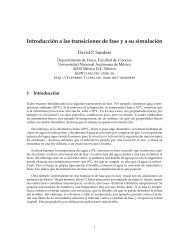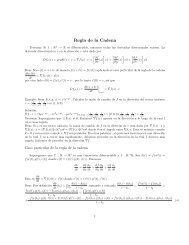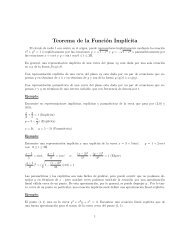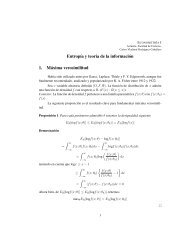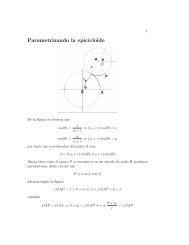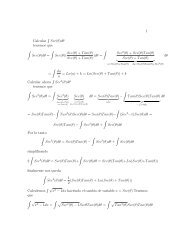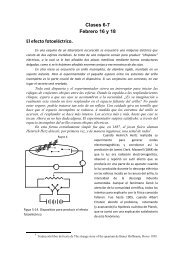"Surely You're Joking, Mr. Feynman!" - unam.
"Surely You're Joking, Mr. Feynman!" - unam.
"Surely You're Joking, Mr. Feynman!" - unam.
You also want an ePaper? Increase the reach of your titles
YUMPU automatically turns print PDFs into web optimized ePapers that Google loves.
think to laymen.<br />
For example, I was a little surprised when I was talking to a friend who was going<br />
to go on the radio. He does work on cosmology and astronomy, and he wondered how he<br />
would explain what the applications of this work were. "Well," I said, "there aren't any."<br />
He said, "Yes, but then we won't get support for more research of this kind." I think<br />
that's kind of dishonest. If you're representing yourself as a scientist, then you should<br />
explain to the layman what you're doing and if they don't want to support you under<br />
those circumstances, then that's their decision.<br />
One example of the principle is this: If you've made up your mind to test a theory,<br />
or you want to explain some idea, you should always decide to publish it whichever way<br />
it comes out. If we only publish results of a certain kind, we can make the argument look<br />
good. We must publish both kinds of results.<br />
I say that's also important in giving certain types of government advice.<br />
Supposing a senator asked you for advice about whether drilling a hole should be done in<br />
his state; and you decide it would be better in some other state. If you don't publish such a<br />
result, it seems to me you're not giving scientific advice. <strong>You're</strong> being used. If your<br />
answer happens to come out in the direction the government or the politicians like, they<br />
can use it as an argument in their favor; if it comes out the other way, they don't publish it<br />
at all. That's not giving scientific advice.<br />
Other kinds of errors are more characteristic of poor science. When I was at<br />
Cornell, I often talked to the people in the psychology department. One of the students<br />
told me she wanted to do an experiment that went something like this it had been found<br />
by others that under certain circumstances, X, rats did something, A. She was curious as<br />
to whether, if she changed the circumstances to Y, they would still do A. So her proposal<br />
was to do the experiment under circumstances Y and see if they still did A.<br />
I explained to her that it was necessary first to repeat in her laboratory the<br />
experiment of the other person to do it under condition X to see if she could also get<br />
result A, and then change to Y and see if A changed. Then she would know that the real<br />
difference was the thing she thought she had under control.<br />
She was very delighted with this new idea, and went to her professor. And his<br />
reply was, no, you cannot do that, because the experiment has already been done and you<br />
would be wasting time. This was in about 1947 or so, and it seems to have been the<br />
general policy then to not try to repeat psychological experiments, but only to change the<br />
conditions and see what happens.<br />
Nowadays there's a certain danger of the same thing happening, even in the<br />
famous field of physics. I was shocked to hear of an experiment done at the big<br />
accelerator at the National Accelerator Laboratory, where a person used deuterium. In<br />
order to compare his heavy hydrogen results to what might happen with light hydrogen,<br />
he had to use data from someone else's experiment on light hydrogen, which was done on<br />
different apparatus. When asked why, he said it was because he couldn't get time on the<br />
program (because there's so little time and it's such expensive apparatus) to do the<br />
experiment with light hydrogen on this apparatus because there wouldn't be any new<br />
result. And so the men in charge of programs at NAL are so anxious for new results, in<br />
order to get more money to keep the thing going for public relations purposes, they are<br />
destroying possibly the value of the experiments themselves, which is the whole<br />
purpose of the thing. It is often hard for the experimenters there to complete their work as



